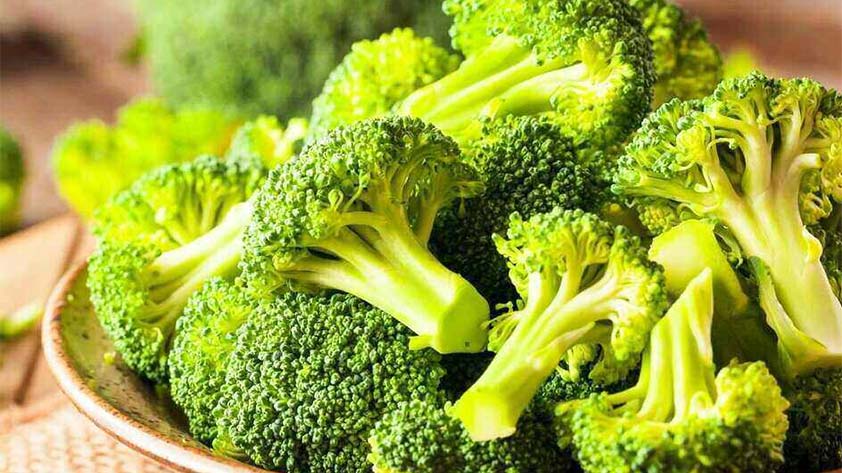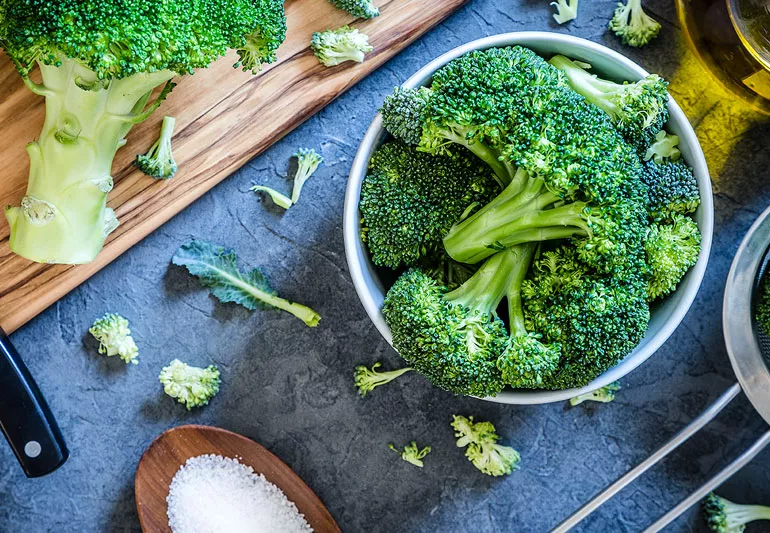Broccoli is Good for Health or Not
Broccoli is Good for Health or Not? – Broccoli, a cruciferous vegetable alongside kale, cauliflower, and Brussels sprouts, is more than just a funny-looking tree on your plate. It’s a powerhouse of nutrients and antioxidants that deliver a surprising range of health benefits.
Packed with vitamins, minerals, and fiber, all while being low in calories, broccoli is a friend to your body and your taste buds.
This article dives into the world of broccoli, exploring its nutritional content, its potential health benefits, and some tips to help you incorporate this versatile veggie into your meals.
Broccoli is a cruciferous vegetable packed with essential nutrients that offer a variety of health benefits.
- Rich in Vitamins and Minerals: Broccoli boasts vitamins C, K, and A, along with potassium, calcium, and iron. These antioxidants shield your body from harm and reduce inflammation.
- High in Fiber: Excellent source of dietary fiber, broccoli promotes digestion, keeps you feeling full, and maintains a healthy gut. Fiber is also linked to reduced inflammation.
- Antioxidant Powerhouse: Broccoli is loaded with antioxidants like vitamins C and E, beta-carotene, and various flavonoids. These antioxidants help protect your cells from damage and may lower your risk of chronic diseases.
- Possible Cancer Fighter: Broccoli, part of the cruciferous vegetable family, may have anti-cancer properties. It contains glucosinolates, which the body can convert into cancer-fighting substances.
- Supports Heart Health: Broccoli’s anti-inflammatory, antioxidant, and high-fiber content all contribute to good heart health. It may help lower cholesterol, regulate blood pressure, and promote overall cardiovascular health.
- Protects Your Eyes: The high levels of vitamin A and antioxidants in broccoli promote eye health and may help prevent age-related macular degeneration and cataracts.
- Boosts Your Immune System: The vitamin C in broccoli strengthens your immune system and promotes collagen production, wound healing, and iron absorption. Additionally, compounds like indole-3-carbinol and diindolylmethane found in broccoli may influence the immune system, regulating the immune response and reducing inflammation.
- Promotes Bone Health: Broccoli is an excellent source of calcium, essential for healthy bone growth and preventing osteoporosis. It also contains vitamin K, which is crucial for maintaining strong bones [20].
- Aids in Weight Management: Low in calories but high in fiber, broccoli keeps you feeling full and can support weight management and a healthy metabolism.
- Supports Digestive Health: The high fiber content of broccoli contributes to a healthy digestive system by ensuring regular bowel movements and promoting the growth of good gut bacteria.
| Nutrients | Health Benefits |
| Vitamins (C, K, A) | Antioxidant properties, Immune system support |
| Minerals (Potassium, Calcium, Iron) | Antioxidant properties |
| Fiber | Digestive health, Weight management |
| Antioxidants (Vitamin C, E, Beta-Carotene, Flavonoids) | Protects against chronic diseases |
| Glucosinolates (Potential Cancer Fighters) | Possible anti-cancer properties |
| Bone Health (Calcium, Vitamin K) | Promotes bone health |
| Nutrient | Amount in 1 cup
Broccoli |
Daily Adult
Requirement |
| Energy (calories) | 24.3 | 1,800–3,000 |
| Carbohydrate (g) | 4.78 g (including 1 g
of sugar) |
130 g |
| Fiber (g) | 1.82 g | 25.2–33.6 g |
| Calcium (mg) | 35 mg
pen_spark |
1,000–1,200 mg |
| Phosphorus (mg) | 50.9 mg | 700 mg |
| Potassium (mg) | 230 mg | 4,700 mg |
| Vitamin C (mg) | 40.5 mg | 75–90 mg |
| Folate (mcg) | 49.4 mcg | 400 mcg |
| Vitamin A (mcg) | 6.08 mcg | 700–900 mcg |
| Beta-carotene (mcg) | 70.7 mcg | No data available |
| Lutein and zeaxanthin (mcg) | 566 mcg | No data available |
| Vitamin E (mg) | 0.11 mg | 15 mg |
| Vitamin K (mcg) | 77.5 mcg | 90–120 mcg |
Broccoli is a cruciferous vegetable, brimming with essential vitamins, minerals, and antioxidants. These antioxidants act as the body’s defense system, potentially helping to prevent the development of various health problems.
Our bodies naturally produce molecules called free radicals during processes like metabolism. Environmental stresses can also contribute to their formation.
Free radicals, also known as reactive oxygen species, become harmful in large amounts. They can damage cells, potentially leading to diseases like cancer.
While the body eliminates many free radicals, dietary antioxidants provide valuable support.
Health Benefits of Broccoli
This article explores the specific health benefits linked to broccoli’s impressive nutritional content.
Reduced Cancer Risk
Cruciferous vegetables, including broccoli, contain a range of antioxidants that may help prevent cell damage linked to cancer development. One such antioxidant is sulforaphane, a sulfur-containing compound responsible for the vegetable’s slightly bitter taste.
Some scientists believe cruciferous vegetables might play a role in “green chemoprevention.” This approach involves consuming whole plants or their extracts to potentially help prevent cancer.
Broccoli also contains indole-3-carbinol, a compound with potentially powerful antitumor properties according to research from 2019. Other cruciferous vegetables like cauliflower, Brussels sprouts, kale, and turnips may offer similar benefits.

Improved Bone Health
Calcium and collagen work together to build strong bones. Over 99% of the body’s calcium resides in bones and teeth. Collagen production also requires vitamin C, both of which are found in broccoli.
Vitamin K plays a role in blood clotting, and some experts suggest it might help prevent or treat osteoporosis. Individuals with low vitamin K levels may be more prone to bone formation problems. Consuming enough vitamin K from dietary sources may contribute to maintaining bone health.
According to the United States Department of Agriculture (USDA), a cup of broccoli (approximately 76 grams) provides 3% to 3.5% of the daily calcium requirement, 45-54% of the daily vitamin C requirement, and a significant portion (64-86%) of the daily vitamin K requirement, depending on age and sex.
Enhanced Immune System Function
Vitamin C, an antioxidant found in broccoli, offers a variety of health benefits. It supports the immune system and may potentially help prevent cancer, cardiovascular disease, cataracts, and anemia. Studies suggest that vitamin C supplements might also reduce the severity and duration of the common cold.
A Multitasking Marvel for Glowing Skin, Digestion, and More
Broccoli’s impressive nutritional profile extends beyond just boosting immunity and bone health. This wonder veggie offers a surprising range of benefits for your skin, digestion, and overall well-being.
Promoting Radiant Skin
Vitamin C, abundant in broccoli, is essential for collagen production. Collagen acts as the body’s scaffolding, supporting the structure of skin, cells, and organs.
As an antioxidant, vitamin C also helps shield the skin from damage, potentially reducing wrinkles and signs of aging. Studies even suggest it may play a role in preventing or treating skin conditions like shingles and skin cancer.
Aiding Digestion
Dietary fiber, another component of broccoli, plays a crucial role in promoting regularity, preventing constipation, and maintaining a healthy digestive tract.
It may even lower the risk of colon cancer. Research suggests that consuming high levels of fiber is linked to a reduced risk of colorectal cancer.
A single cup of broccoli provides a significant portion of your daily fiber needs, contributing to a smooth-running digestive system.
Reducing Inflammation
Inflammation arises when the immune system is activated to fight off invaders. While it’s a natural response to infection, chronic inflammation can be a factor in conditions like arthritis, type 1 diabetes, and metabolic syndrome. Broccoli’s potential anti-inflammatory properties are promising.
Studies have shown that sulforaphane, the antioxidant it contains, helps reduce inflammation markers in lab tests. Additionally, research involving human participants suggests that consuming broccoli sprouts may lead to lower inflammation levels.
Lowering Risk of Diabetes
Studies suggest that broccoli consumption may offer benefits for individuals with type 2 diabetes, potentially due to the presence of sulforaphane.
Research also indicates that a high-fiber diet, like one that includes broccoli, may be linked to a lower risk of developing type 2 diabetes and can help manage blood sugar levels in people who already have it.
A Cruciferous Champion for Your Heart
Broccoli’s health benefits extend far beyond its ability to strengthen bones and immunity. This cruciferous powerhouse also offers significant protection for your heart.
Combating Cardiovascular Disease
The fiber, potassium, and antioxidant content in broccoli work together to potentially reduce the risk of cardiovascular disease (CVD).
A large-scale study conducted in 2018 showed that older women who consumed a diet rich in cruciferous vegetables had a lower risk of atherosclerosis, a condition that affects the arteries and can lead to heart attacks or strokes. This benefit is likely attributed to the antioxidant profile of cruciferous vegetables, particularly sulforaphane.
The American Heart Association (AHA) recommends increasing potassium intake while reducing sodium in your diet. Potassium helps relax blood vessels and lowers the risk of high blood pressure, a key contributor to atherosclerosis and other cardiovascular problems. A single cup of broccoli fulfills nearly 5% of your daily potassium requirement.
Fiber also plays a significant role in heart health. A 2017 review found that individuals with a high-fiber diet had a lower risk of CVD and lower levels of blood lipids (fats) compared to those with low fiber intake.
By incorporating broccoli into your diet, you’re providing your body with a heart-healthy combination of fiber, potassium, and antioxidants.
Selecting and Storing Broccoli for Optimal Freshness
Here are some tips to ensure you choose the freshest broccoli and store it properly:
- Pick of the Bunch: Opt for broccoli florets that are firm and tightly closed, with a vibrant dark green color. Avoid broccoli that feels limp, appears yellowish, or shows signs of wilting.
- Freshness Matters: Fresh, young broccoli should not have a fibrous, woody, or strong sulfurous taste. These qualities can indicate the broccoli has been stored improperly or is past its prime.
- Storage Secrets: To maximize freshness, store unwashed broccoli in a loose or perforated bag within your refrigerator’s crisper drawer. Washing should only be done right before consumption, as moisture can lead to mold growth and make the broccoli limp.
Important Considerations
- Vitamin K and Blood Thinners: Broccoli is a good source of vitamin K, which can interact with blood-thinning medications like warfarin (Coumadin). If you take blood thinners, it’s crucial to maintain a consistent intake of vitamin K-rich foods like broccoli to avoid affecting the medication’s effectiveness.
- Potential Allergies: Some people may experience allergic reactions to compounds found in broccoli and other cruciferous vegetables. Symptoms like hives, swelling, or difficulty breathing require immediate medical attention, as severe allergic reactions (anaphylaxis) can be life-threatening.
- Peace of Mind on Pesticides: Many vegetables carry trace amounts of pesticides. Fortunately, broccoli is included on the Environmental Working Group’s 2019 list of “clean” vegetables, indicating a low risk of contamination.

A graduate of Computer Science and Information Management Technology. Diploma – Caregiving, Certificates – Dementia and Diabetes Awareness and Management. A researcher, blogger, songwriter, singer and acoustic guitarist. Born in an environment where natural talents such as healing are imparted at our natural birth. This natural talents of healing is the result of our genetic inheritance and the training from family environment.























